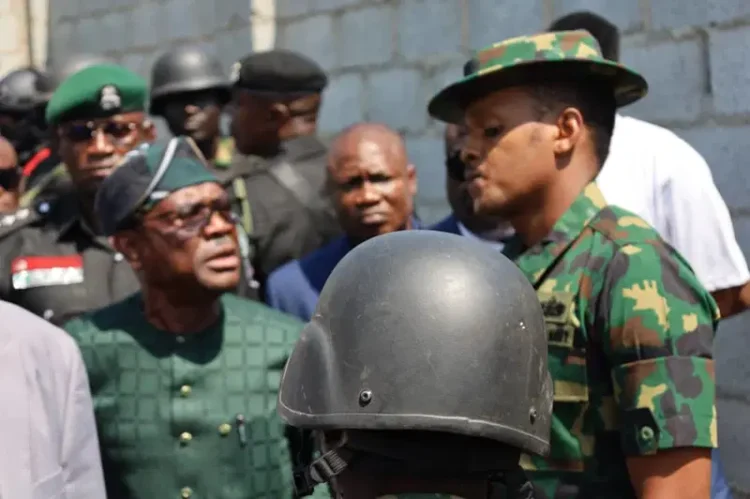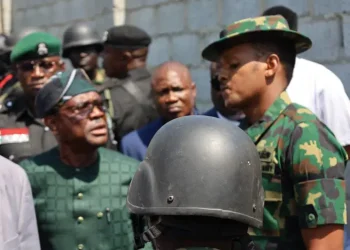On Monday, November 11, 2025, the quiet calm of Gaduwa, one of Abuja’s typically peaceful neighbourhoods was disrupted by a dramatic confrontation that quickly drew residents to the streets.
What began as a routine inspection escalated into a tense standoff that many feared could erupt into a clash between government officials and military personnel.
FCT Minister Nyesom Wike arrived with a full security convoy to inspect an ongoing construction on land originally designated for park and recreational use. According to him, the plot, allocated to Santos Estate Limited, had been improperly converted for residential development without the necessary approvals. Wike said he came “to support Development Control officials obstructed earlier by military personnel and to enforce land-use regulations.”
Lieutenant Yerima in the spotlight
Leading the naval personnel on site was Lieutenant A.M. Yerima, whose calm discipline amid rising tempers made him the centre of national attention. As heated words passed between soldiers and Wike’s security aides, Yerima repeatedly instructed his men to stand down with the command: “Ajuwaya!”
Despite the de-escalation, tensions persisted. Wike insisted on exercising FCTA authority over the land, while Yerima maintained that the property had proper documentation and that he was acting under orders.
When Wike snapped at him, calling him a fool and ordering him to shut up; Yerima’s composed response, captured on video, spread rapidly nationwide:
“I’m an officer. I have my integrity.
I am not a fool; you can’t shut me up.”
His restraint instantly became a national talking point.
The land at the centre of it all
The dispute revolves around Park No. 161, Cadastral Zone A03, Garki II, and Plot 1946 (A, B, C), Cadastral Zone B13, Gaduwa. FCTA documents indicate the lands were legally allocated. A July 7, 2025 letter revoked initial approvals on Park 161, while a May 17, 2022 letter confirmed lawful subdivision of the 31-hectare Gaduwa parcel to Santos Estate Limited and others. Later reports, however, suggested that some of these approvals had been cancelled, adding fuel to the public debate.
Nationwide reactions
The confrontation triggered wide-ranging reactions about land administration, respect for uniforms, and the limits of civilian authority.
A military officer who spoke anonymously said the incident was avoidable and criticised the Minister’s approach. Activist Deji Adeyanju praised Yerima’s calmness, while former Chief of Army Staff Lt. Gen. Tukur Buratai (rtd.) called Wike’s conduct “a danger to national security,” noting the importance of respecting uniformed officers.
Former CDS Gen. Lucky Irabor also stressed:
“The uniform represents the authority of the state. Insulting it is insulting Nigeria.”
Veterans’ groups threatened protests if Yerima faced punishment, and former Aviation Minister Osita Chidoka said Wike’s approach undermined his office, insisting he should have followed institutional channels. Analysts like Farooq Kperogi hailed Yerima as an example of courage under pressure, while some APC figures criticised the officer and accused unnamed elites of resisting Wike’s reforms.
Admiral Gambo’s legacy noted
The drama also drew attention to former Chief of Naval Staff Vice Admiral Awwal Zubairu Gambo, whose tenure was marked by major maritime reforms, including Nigeria’s exit from the global piracy list and the commissioning of major naval assets. Commentators linked Yerima’s discipline to the standards set during Gambo’s leadership.
Wike responds
Addressing the media, Wike insisted he had no conflict with the military and that his comments were misunderstood.
“I respect the military deeply. No officer should carry out an illegal order. If an instruction is unlawful, you have the right to decline.”
He warned journalists against sensationalising the matter, emphasising that his only goal was to uphold the law.
Calm restored after presidential intervention
President Bola Ahmed Tinubu was widely credited for his swift behind-the-scenes intervention, which helped de-escalate tensions and prevent an institutional crisis.
By Thursday, the bulldozer stationed on the disputed land was finally withdrawn, an act that drew applause from residents. The moment symbolised a broader public desire for fairness, order, and governance anchored on institutions rather than personalities.































